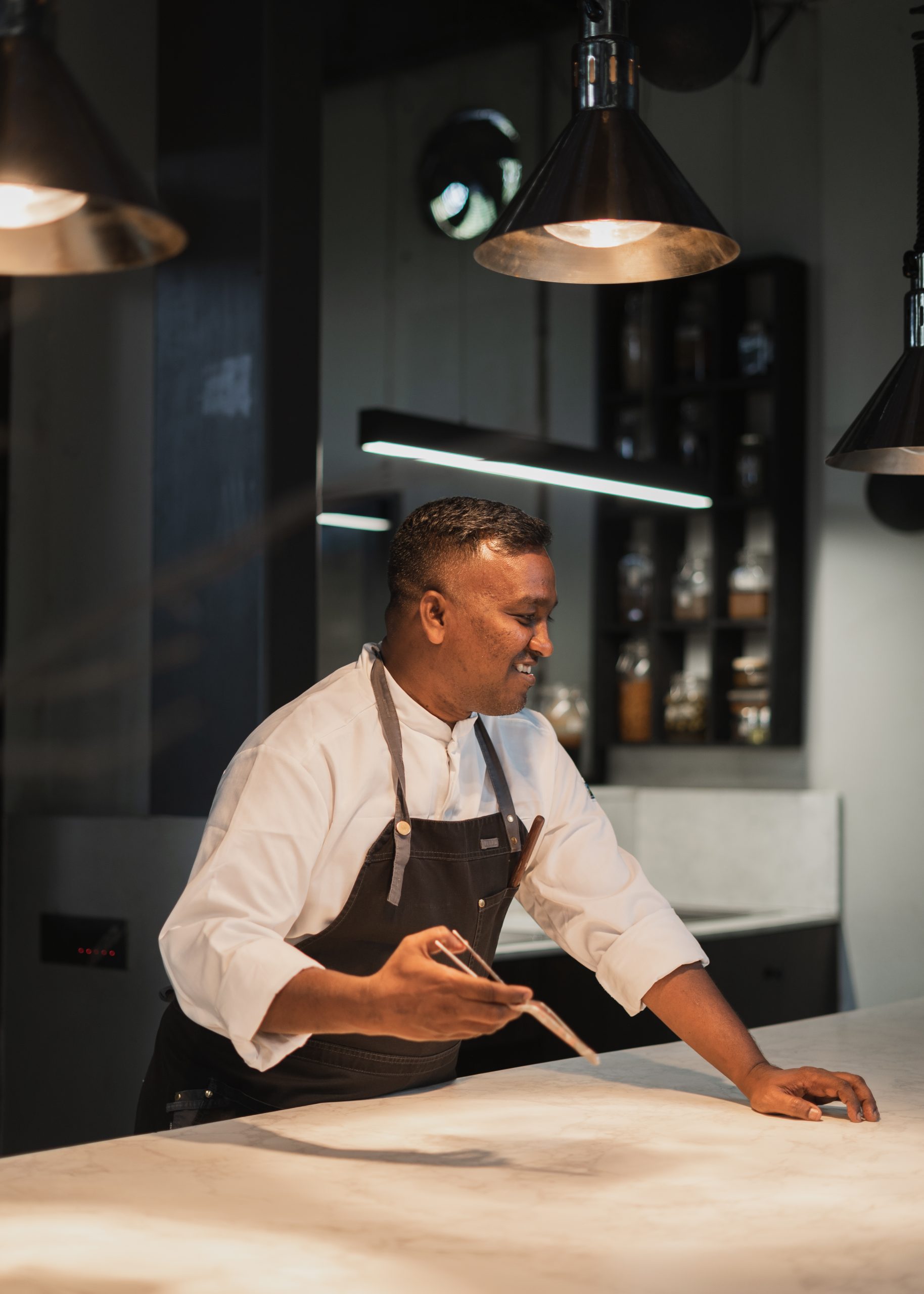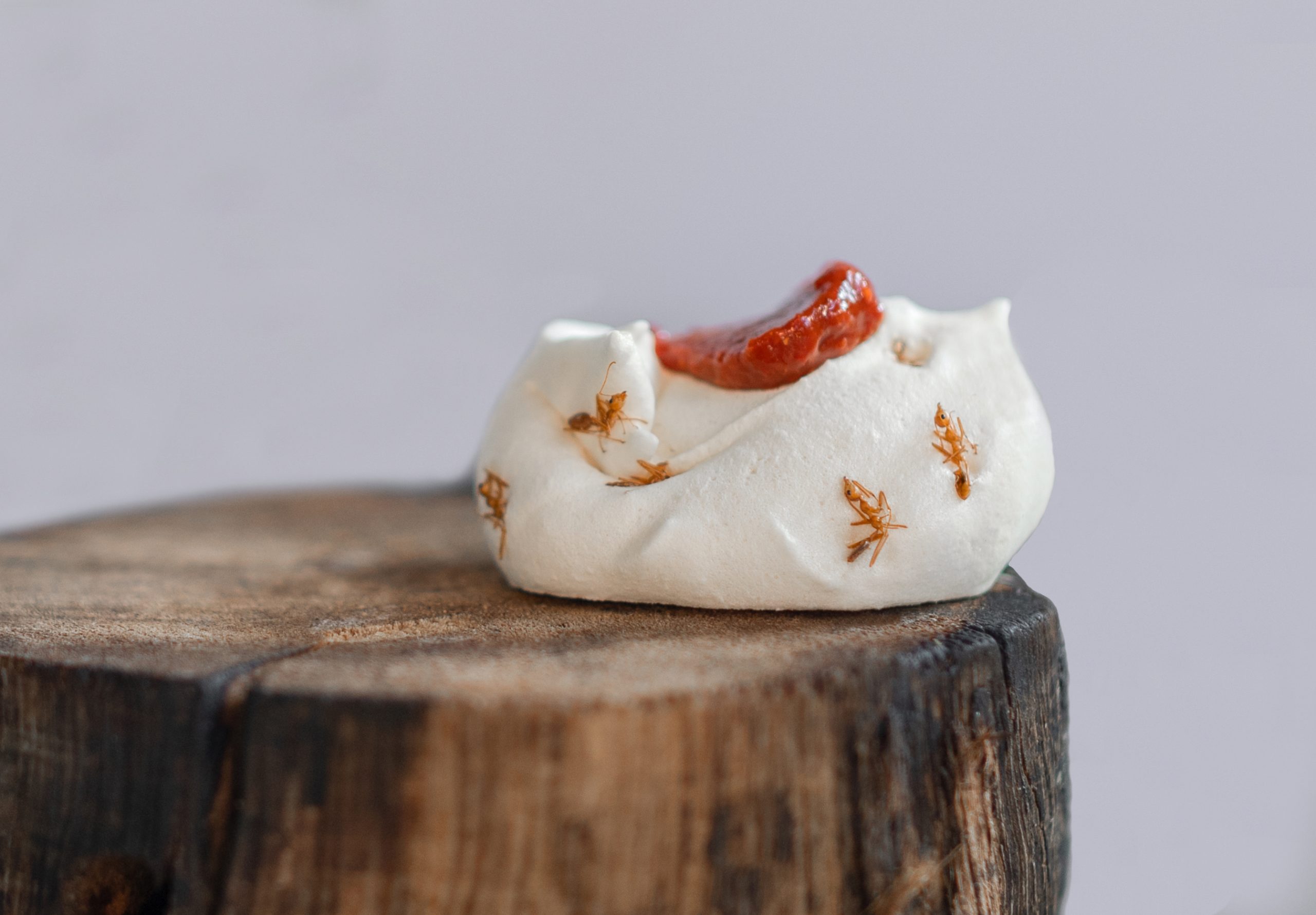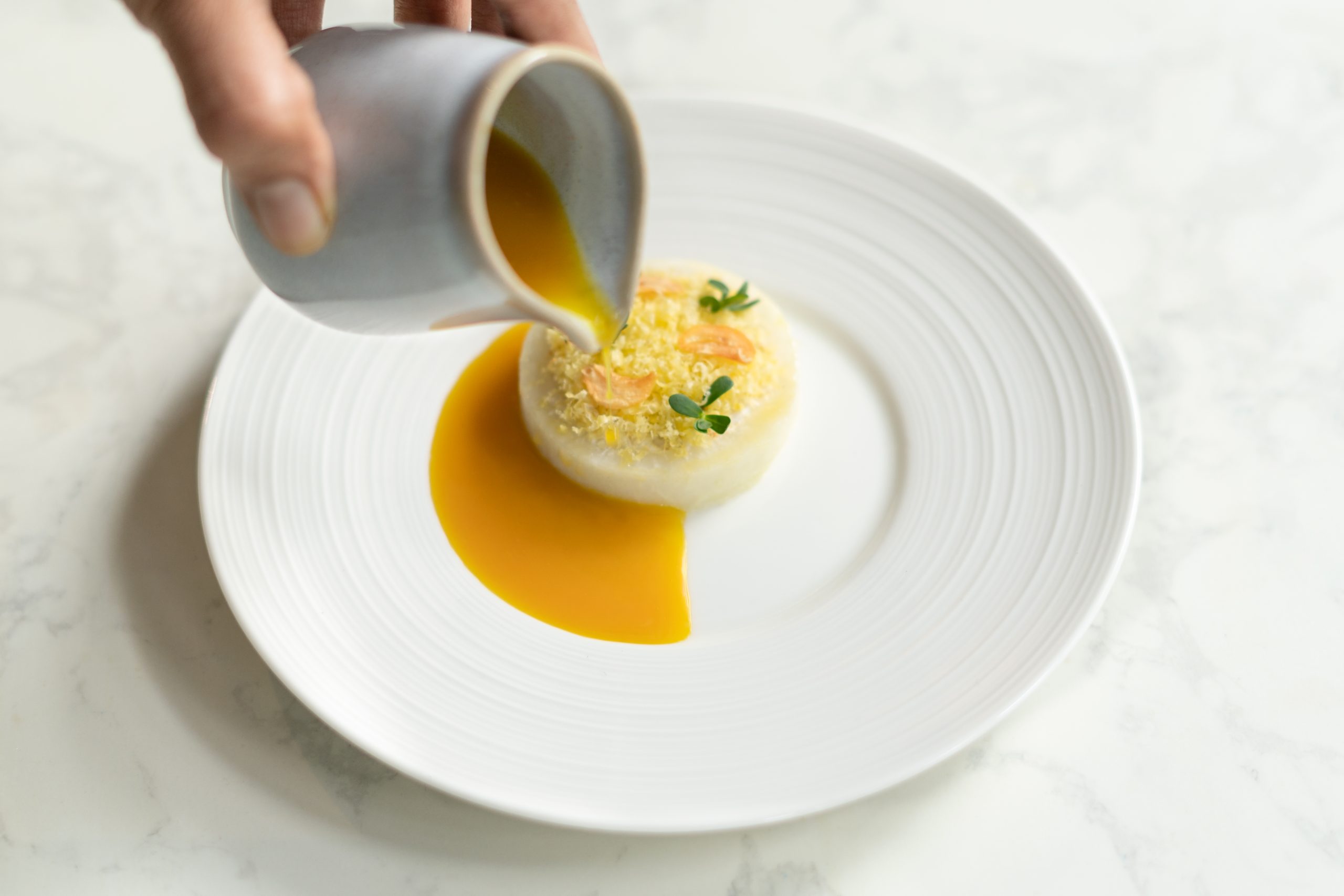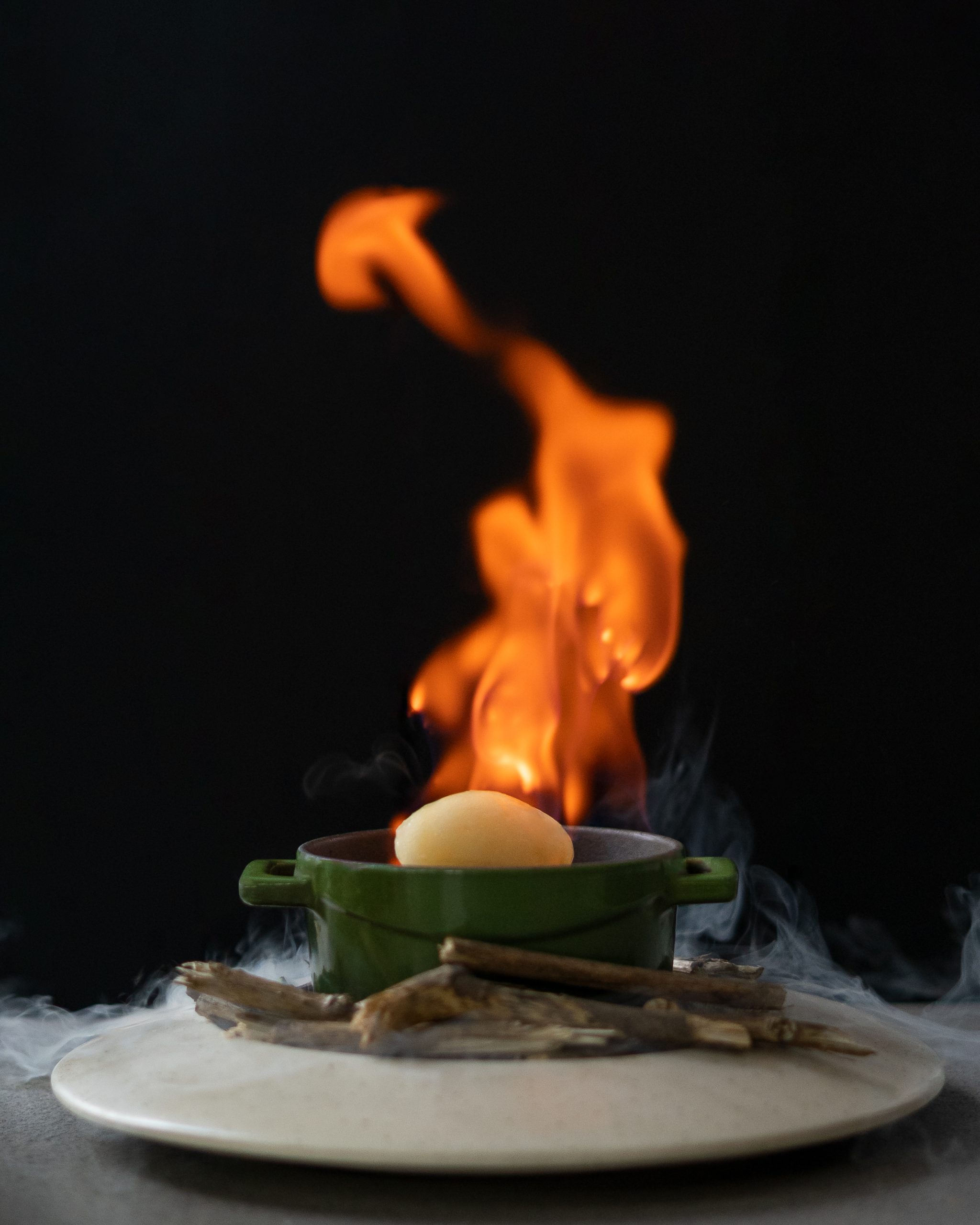(October 01, 2023) His food philosophy is a dramatic showcase of locally sourced organic produce and molecular gastronomy. Meet Chef Johnson Ebenezer of Farmlore in Bengaluru where fire ants are a signature dish.
The restaurant (though it is more of a gourmet experience centre) only serves 18 guests per meal – lunch and dinner. It is closed two days in a week so everyone has time to recharge. And the man behind this avant garde gourmand dining experience is Chef Johnson Ebenezer. He loves molecular gastronomy and all its accompanying drama like firing up a dish at the table and liquid nitrogen. But he follows the principle of locavore — cooking what grows within a 100-mile radius of where he is based; and can even make curd rice a piece of art in the five and ten-course meals he serves.

Chef Johnson Ebenezer of Farmlore in Bengaluru.
Johnson, who started his career with The Taj Group of Hotels, worked on a cruise liner and set up the Michelin guide listed restaurant Nadodi in Kuala Lumpur, Malaysia. He recalls in an exclusive with Global Indian, “Nadodi, which means nomad or gypsy, served three cuisines, that of Sri Lanka, Tamil Nadu and Kerala. They are interlinked to some extent and I was instrumental in establishing the brand. I created the menu and added the biryani to it. Even now, years after I have left, the biryani remains a constant.”
Gastronomic Delights
On his return to India he met with Kaushik Raju, the investor on whose land the restaurant now operates. The idea was to create an organic, yet exclusive dining venue, and it grew, over time, into Farmlore. Located in Yelahanka, it’s a 30-minute drive from the Bengaluru airport.
At Farmlore, the sky is the limit when it comes to experimentation. The food is certainly not for those who like it traditional. He says, “I cook for those who want to know about the creative process that has gone into preparing the food. I enjoy molecular gastronomy as it helps me improvise. I can experiment with my ingredients and harness my creativity. I like to work with sensory perceptions around food and its purpose. It is an eclectic approach to locavore ingredients, using modern techniques.”

Farmlore’s fire ants are a signature dish.
Speaking of local ingredients, one unusual item served is the fire ant. These ants, which are part of the Kodagu or Coorgi cuisine, are pounded into a chutney by the local tribals or Badagas. They are high in protein and Johnson serves these ants, which are the signature dish at Farmlore, in various forms. A meringue or sorbet, on a canape or in a salad, he even has his vegetarian guests willing to try them. Depending on the trees they are collected from – lemon or mango – they echo the citrusy or mangoey flavour respectively. He reveals, “I tell stories through my food. I use all the senses – of sight, smell and taste. In fact, we have even developed a process to capture petrichor – the smell of the first rain when it hits the earth. We spray it to add to the ambience.”
Another signature dish always on the menu is the alcohol-based Trippy Gummy Bears; a favourite with guests.
Modern Avatars, Traditional Ingredients
Also relying on the principle of umami, the fifth taste, he experiments with much-loved, universally popular dishes. He says, “For example, most people like to eat rasam when it is raining; we have given it a spin to make variants of rasam in different flavours; it won’t look like rasam but the taste is reminiscent of it. Similarly, we make a sorbet out of popcorn.”
Johnson is a firm believer of transforming an ingredient or dish into hitherto unimagined avatars. When served in their exquisitely plated version as one of the five courses – they are reminiscent of what their traditional form is when you taste them; like the Tair Sadam is served as a chilli jelly but the taste is of curd rice. Under their creative experiments, traditional ingredients are metamorphosed into modern gastronomical wonders by the creativity of Johnson and his head chef Maitreye Iyer.

The dining experience at Farmlore is unlike that of other exclusive food venues. Each course is different, the menu is not announced in advance and the five-course meal costs Rs 3500 on weekdays and the ten-course one on weekends costs Rs 5500, including taxes. Well-heeled guests have been known to book the entire 18 seats for a private meal or a romantic proposal after which they fly off to distant foreign lands. Others fly in from Mumbai and Hyderabad just for dinner. Some of his regular clients are the VIPs of the country and for reasons of privacy, Johnson cannot reveal their identities.
Locavore to Farmlore
The website states that they serve what they grow and follow traditional and ethical principles including cooking on fire with wood procured from the mango trees growing on their 35-acre farm. Their produce, poultry and meat are organically cultivated at the farm itself, and includes moringa, pumpkins, lemons, mango, duck, quail, prawns, horse gram, jackfruit, ice apples, etc. They use organic compost, where the urine of the cows released at four in the morning is collected, mixed with mulch and fermented with jaggery and neem to make fertiliser. They also have 22 of the local breed of cows and the ghee, butter, cheese, dahi and ice cream is all made from the milk of these cows. Solar panels for lights and wood fire to cook make it an organic, back to roots, self-sustaining enterprise through and through.

Johnson can experiment with any food item and transform it to a contemporary bite sized portion. Jamun with salt and chillies shows up as a jamun popsicle on his menu. Ridge gourd, breadfruit, raw jackfruit, parsnips, asparagus and rainbow carrots, nasturtiums, purple cabbage – he plays around with them all. His favourite ingredient to work with though is salt. And not just any salt, he procures the mineral-rich Sannikatta salt from Gokarna in coastal Karnataka and has been using it ever since he got to know about it. He says, “It is like black salt, but more earthy and potent and one has to intuitively gauge how much to use. I also use liquid jaggery called joni bella, which I source from Northern Karnataka. It doesn’t solidify and I don’t use processed sugar or iodised salt at all.” He also likes to cook different kinds of rice – ambemohr, gobindbhog, jeerakshala, arborio, kesar kollam etc. He says, “Each strain cooks differently and they all have different flavours so it becomes very challenging.”
With the country’s top celebrities as his clients, and his own global exposure to food trends, what does he see as the next gastronomic practice everyone might follow? He says, “Mock meat is a trend right now, it is a mainstay for vegans. Open fire cooking is also becoming a trend in the West. Barbecued and grilled food and oats are making a big comeback.” Someday, he plans to write a cookbook, though his will be remarkably different, with illustrations drawn by his children. Till then, experimentation is the order of the day for Johnson.
On his travels, Chef Johnson likes to eat at:
- Singapore: Tian Tian; Hainanese Chicken Rice; my all-time favourite
- Cheek By Jowl by Sri Lankan Chef Rishi Nalendra. I loved his flavours
- Chennai: Buhari, Mount Road. Patti Samosa. Sheer nostalgia for me
- Chicago: Alenia, by Chef Achatz. This one is always on my list; someday I would want to visit this place because to me that was the first cookbook which I got for myself and ever since then it has grown on me
- Follow Chef Johnson on Instagram

